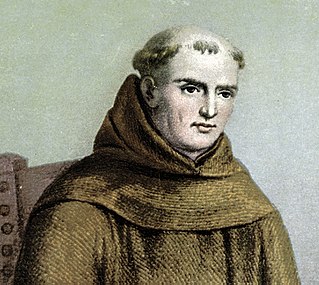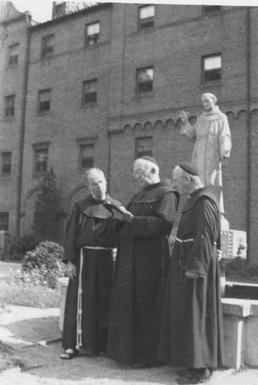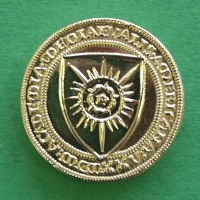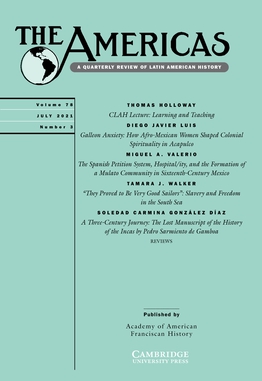Related Research Articles

Mission Santa Barbara is a Spanish mission in Santa Barbara, California. Often referred to as the ‘Queen of the Missions,’ it was founded by Padre Fermín Lasuén for the Franciscan order on December 4, 1786, the feast day of Saint Barbara, as the tenth mission of what would later become 21 missions in Alta California.

Junípero Serra y Ferrer, popularly known simply as Junipero Serra, was a Spanish Catholic priest and missionary of the Franciscan Order. He is credited with establishing the Franciscan Missions in the Sierra Gorda, a UNESCO World Heritage Site. He later founded a mission in Baja California and the first nine of 21 Spanish missions in California from San Diego to San Francisco, in what was then Spanish-occupied Alta California in the Province of Las Californias, New Spain.
Gaius Julius Hyginus was a Latin author, a pupil of the scholar Alexander Polyhistor, and a freedman of Caesar Augustus. He was elected superintendent of the Palatine library by Augustus according to Suetonius' De Grammaticis, 20. It is not clear whether Hyginus was a native of the Iberian Peninsula or of Alexandria.
Latin American studies (LAS) is an academic and research field associated with the study of Latin America. The interdisciplinary study is a subfield of area studies, and can be composed of numerous disciplines such as economics, sociology, history, international relations, political science, geography, gender studies, and literature.
Clarence Henry Haring was an important historian of Latin America and a pioneer in initiating the study of Latin American colonial institutions among scholars in the United States.
The Catholic University of America Press, also known as CUA Press, is the publishing division of The Catholic University of America. Founded on November 14, 1939, and incorporated on July 16, 1941, the CUA Press is a long-time member of the Association of University Presses. Its editorial offices are located on the campus of the Catholic University of America in Washington, D.C. The Press has over 1,000 titles in print and currently publishes 40 new titles annually, with particular emphasis on theology, philosophy, ecclesiastical history, medieval studies, and canon law. CUA Press distributes books on behalf of Sapientia Press of Ave Maria University, books of the Franciscan University of Steubenville Press, Humanum Academic Press of the John Paul II Institute, and for the Academy of American Franciscan History. CUA Press also publishes books under its Catholic Education Press imprint.
John Henry Coatsworth is an American historian of Latin America and the former provost of Columbia University. From 2012 until June 30, 2019, Coatsworth served as Columbia provost. From 2007 until February 2012 Coatsworth was the dean of Columbia's School of International and Public Affairs (SIPA), and served concurrently as interim provost beginning in 2011. Coatsworth is a scholar of Latin American economic, social and international history, with an emphasis on Mexico, Central America, and the Caribbean.
Jeffrey F. Hamburger is an American art historian specializing in medieval religious art and illuminated manuscripts. In 2000 he joined the faculty of Harvard University, where in 2008 he was appointed the Kuno Francke Professor of German Art and Culture. Hamburger received his B.A., M.A and Ph.D from Yale and has previously held professorships at Oberlin College and the University of Toronto. Elected a Fellow of the Medieval Academy in 2001, he has won numerous awards for his publications, among them: the Charles Rufus Morey Prize of the College Art Association (1999), the Roland H. Bainton Book Prize in Art & Music (1999), the Otto Gründler Prize of the International Congress on Medieval Studies (1999), the Jacques Barzun Prize in Cultural History of the American Philosophical Society (1998), the John Nicholas Brown Prize of the Medieval Academy of America (1994), and the Gustave O. Arlt Award in the Humanities of the American Council of Graduate Schools (1991). His research has been supported by fellowships from the Guggenheim Foundation, the American Philosophical Society, the Institute for Advanced Study, the National Endowment for the Humanities, the Center for Advanced Study in the Visual Arts, and the Alexander von Humboldt Foundation. In 2009 Hamburger was elected a member of the American Academy of Arts and Sciences and in 2010, of the American Philosophical Society. In 2015 he was awarded an Anneliese Maier Research Award by the Alexander von Humboldt Foundation. In 2022 he was awarded the Gutenberg Prize of the City of Mainz and the Internationale Gutenberg-Gesellschaft.
Yakov Malkiel was a U.S. (Russian-born) Romance etymologist and philologist. His specialty was the development of Latin words, roots, prefixes, and suffixes in modern Romance languages, particularly Spanish. He was the founder of the journal Romance Philology.

Philotheus Boehner was a member of the Franciscan order known for medieval scholarship.

The Haskins Medal is an annual medal awarded by the Medieval Academy of America. It is awarded for the production of a distinguished book in the field of medieval studies.
Lewis Hanke (1905–1993) was an American historian of colonial Latin America, and is best known for his writings on the Spanish conquest of Latin America. Hanke, along with two others, Irving A. Leonard and John T. Lanning, presented a revisionist narrative of colonial history that focused on the role of Bartolomé de las Casas, who famously advocated for the rights of Native Americans, and searched for just resolutions to the tensions between the conquistadores and the natives during the colonial period of Spanish rule. Hanke's writings documented Las Casas' work as a political activist, historian, political theorist, and anthropologist. His scholarship also uncovered evidence to support Hanke's claim that Las Casas did not act as the sole voice of conscience during the colonial era, but actually constituted the head of what was a larger reform movement by a number of Spanish colonists to prevent "the destruction of the Indies.”
Leslie Michael Bethell is an English historian and university professor, who specialises in the study of 19th- and 20th-century Latin America, focusing on Brazil in particular. He received both his Bachelor of Arts and doctorate in history at the University of London. He is emeritus professor of Latin American history, University of London, and emeritus fellow of St Antony's College, University of Oxford. Bethell has served as visiting professor at the University Research Institute of Rio de Janeiro, the University of California, San Diego, the University of Chicago, the Fundação Getulio Vargas in Rio de Janeiro, the University of São Paulo and most recently the Brazil Institute, King's College London from 2011 to 2017. He has been associated with the Woodrow Wilson International Center for Scholars for many years, most recently as senior scholar of the Brazil Institute from 2010 to 2015. He was a fellow of St Antony's College and founding director of the Centre for Brazilian Studies at the University of Oxford from 1997 to 2007. He was lecturer, reader and professor of Latin American history in the University of London from 1966 to 1992 and director of the University of London Institute of Latin American Studies from 1987 to 1992.
Woodrow Wilson Borah was a U.S. historian of colonial Mexico, whose research contributions on demography, economics, and social structure made him a major Latin Americanist. With his 1999 death "disappears the last great figure in the generation that presided over the vast expansion of the Latin American scholarly field in the United States during the years following World War II." With colleagues at University of California, Berkeley who came to be known as the "Berkeley School" of Latin American history, Borah pursued projects to gather data from archives on indigenous populations, colonial enterprises, and "land-life" relations that revolutionized the study of Latin American history.
Conference on Latin American History, (CLAH), founded in 1926, is the professional organization of Latin American historians affiliated with the American Historical Association. It publishes the journal The Hispanic American Historical Review.

The Hispanic American Historical Review is a quarterly, peer-reviewed, scholarly journal of Latin American history, the official publication of the Conference on Latin American History, the professional organization of Latin American historians. Founded in 1916, HAHR is the oldest journal of Latin American history, and, since 1926, published by Duke University Press. On July 1, 2017 editorial responsibility shifted from Duke University to Penn State for the 2017-2022 term.
John Tate Lanning was a historian of Spanish America and held the James B. Duke Professor Emeritus position at Duke University. He was a major scholar of colonial Spanish American history and worked to strengthen organizations devoted to Latin American scholarship. In one obituary he was called, “a true giant” in the field. His work on the Spanish Enlightenment in Spanish America challenged received understandings of Spanish obscurantism.
The ideas of the Spanish Enlightenment, which emphasized reason, science, practicality, clarity rather than obscurantism, and secularism, were transmitted from France to the New World in the eighteenth century, following the establishment of the Bourbon monarchy in Spain. In Spanish America, the ideas of the Enlightenment affected educated elites in major urban centers, especially Mexico City, Lima, and Guatemala, where there were universities founded in the sixteenth and seventeenth centuries. In these centers of learning, American-born Spanish intellectuals were already participants in intellectual and scientific discourse, with Spanish American universities increasingly anti-scholastic and opposed to “untested authority” even before the Spanish Bourbons came to power. The best studied is the University of San Carlos Guatemala, founded in 1676.

The Americas: A Quarterly Review of Latin American History is a quarterly peer-reviewed academic journal covering political, social, economic, intellectual, and religious history of the Americas. It is published on behalf of the Academy of American Franciscan History by Cambridge University Press and the editor-in-chief is Ben Vinson III. The Conference on Latin American History awards an annual prize named for the journal's long-time editor, Antonine Tibesar, for the best article published in the previous year.
Antonine Tibesar, O.F.M. was a Franciscan friar, a scholar of the Catholic Church in Latin America, and director of the Academy of American Franciscan History. He edited four volumes of the writings Junípero Serra, founder of the Franciscan missions in late eighteenth-century Alta California, canonized in 2015. Tibesar served as editor of the peer reviewed scholarly journal, The Americas.
References
- ↑ The Academy of American Franciscan History. The Hispanic American Historical Review,24(3), 1944. 541-543. Retrieved from http://www.jstor.org/stable/2508529 accessed 25 May 2018.
- 1 2 "Home - Academy of American Franciscan History". Academy of American Franciscan History.
- ↑ "Jeffrey Burns, PhD". Franciscan School of Theology. Retrieved 20 May 2019.
- ↑ "Finding Aid to the Academy of American Franciscan History Microfilm Collection, 1526-1972, bulk 1700-1800". The Online Archive of California. California Digital Library / UC Berkeley, Bancroft Library . Retrieved May 20, 2019.
- ↑ "The Americas". Cambridge Core . Cambridge University Press. Retrieved May 20, 2019.
- ↑ "The Americas". Project MUSE. Retrieved May 20, 2019.
- ↑ Delpar, Helen. Looking South: The Evolution of Latin Americanist Scholarship in the United States, 1850-1975. University of Alabama Press 2008, p. 133 ISBN 978-0-8173-5464-0
- ↑ "The Academy of American Franciscan History." The Hispanic American Historical Review 24, no. 3 (1944): 541-43. http://www.jstor.org/stable/2508529 accessed 25 May 2018.